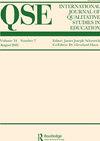教育研究中的位置、位置性和关系
IF 1.1
Q3 EDUCATION & EDUCATIONAL RESEARCH
International Journal of Qualitative Studies in Education
Pub Date : 2023-10-14
DOI:10.1080/09518398.2023.2268036
引用次数: 1
摘要
在本文中,我们提供了立场陈述的关键谱系,并讨论了为什么立场陈述和立场陈述已经成为定性教育研究领域的存在,这些陈述做什么和不做什么,以及关系如何服务于超越个人社会位置的相互关系目的。通过对高影响力教育研究期刊上的50种立场陈述的内容分析,我们从人类学和教育研究领域对权力和代表性的关注出发,对立场陈述如何成为一种体裁进行了理论化和追溯。我们还包括一个对话插曲作为实践,以提升我们自己的经验与立场陈述和我们的解释。我们提供了关于立场陈述的挑衅,以及他们在知识制造项目中的操作。关键词:立场性立场性陈述关系性反身性披露声明未报告潜在利益冲突作者简介:scati de los RíosCati de los Ríos是加州大学伯克利分校教育学院的青少年扫盲和双/多语言教育副教授。她利用民族志和社区研究来记录拉丁裔青年和家庭丰富的公民、民俗和翻译文化和实践。帕特尔(Leigh Patel)是匹兹堡大学教育学院的城市教育教授。她也是全国解放教育委员会的成员。她的研究重点是教育既是社会再生产的有效机器,又具有成为解放工具的潜力。本文章由计算机程序翻译,如有差异,请以英文原文为准。
Positions, positionality, and relationality in educational research
AbstractIn this paper, we provide a critical genealogy of position statements and take up the questions of why positionality and position statements have become a presence in the field of qualitative education research, what these statements do and don’t do, and how relationality may serve purposes of mutuality that reach beyond an individual’s social locations. Using content analysis of fifty position statements found in high-impact educational research journals, we theorize and trace how positionality statements have become a genre, with concerns about power and representation from the field of anthropology and in educational research. We also include a conversational interlude as praxis to lift up our own experiences with positionality statements and our interpretations. We provide provocations about positionality statements and what they operationalize in knowledge making projects.Keywords: Positionalitypositionality statementsrelationalityreflexivity Disclosure statementNo potential conflict of interest was reported.Additional informationNotes on contributorsCati de los RíosCati de los Ríos is an Associate Professor of Adolescent Literacy and Bi/Multilingual Education at UC Berkeley’s School of Education. She uses ethnographic and community-based research to document the rich civic, folkloric, and translingual literacies and practices of Latiné/x youth and families.Leigh PatelLeigh Patel is a professor of urban education at the University of Pittsburgh’s School of Education. She is also a proud national board member of Education for Liberation. Her research focuses on the ways that education is both an efficient machine of social reproduction and holds the potential to be a tool for liberation.
求助全文
通过发布文献求助,成功后即可免费获取论文全文。
去求助
来源期刊

International Journal of Qualitative Studies in Education
EDUCATION & EDUCATIONAL RESEARCH-
CiteScore
2.90
自引率
9.10%
发文量
123
期刊介绍:
The aim of the International Journal of Qualitative Studies in Education (popularly known as QSE) is to enhance the practice and theory of qualitative research in education, with “education” defined in the broadest possible sense, including non-school settings. The journal publishes peer-reviewed empirical research focused on critical issues of racism (including whiteness, white racism, and white supremacy), capitalism and its class structure (including critiques of neoliberalism), gender and gender identity, heterosexism and homophobia, LGBTQI/queer issues, home culture and language biases, immigration xenophobia, domination, and other issues of oppression and exclusion.
 求助内容:
求助内容: 应助结果提醒方式:
应助结果提醒方式:


